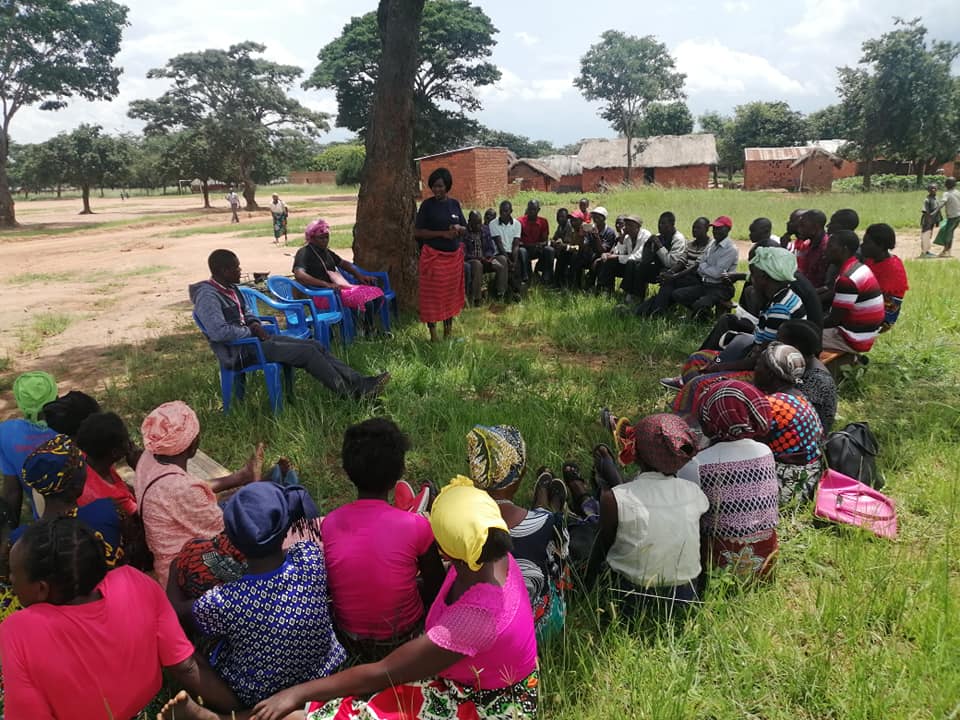ECONOMIC AND SOCIAL ACCOUNTABILITY PROGRAM:
- Natural resources governance and taxation - Zambia is rich in natural resources however the country is deprived from benefiting adequately from natural resources. This programme focus to will be contributing towards ensuring that natural resources benefit the country through taxation, infrastructure development and an empowered extractive host community through research, community mobilization, and advocacy on policy and legal reforms.
- Social accountability – programme focus will be on public finance scrutiny (budget analysis, research, social audits, and budgeting tracking, etc) so as to contribute to resolving the accountability failures in policy and Practice by government departments resulting in increased inequality in the communities.
- Trade and debt – Zambia in a debt crisis. Debt is indeed an increasing threat for the lives of the poorest and most vulnerable, there are root causes behind this problem like a systemic imbalance which includes inadequate legal framework. The programme will focus on advocating for legal reform process around debt contraction and application mechanisms for a sustainable contraction and management. In addition, the programme will advocate for supported policies aimed at raising domestic private savings and foreign direct investment consequently promote the diversification of local production.
- Community Voices - In view of the escalating levels of social, economic and environmental injustices in Zambia, many of the marginalized are left wallowing in abstract poverty with limited to no confidence and knowledge to voice out issues affecting them. It is in this light that the Economic and Social Accountability programme seeks to Mobilize communities through its community voices thematic area, towards enhancing their ability to voice out concerns on prevailing issues affecting them through conscientization (sensitization, awareness raising).
CONFLICT FOR TRANSFORMATION AND PEACE BUILDING PROGRAMME:
- Access to Justice - Creating access to justice for the local people and giving arbitration. Caritas Zambia would want to ensure that the locals have access to paralegal officers for free legal advice and arbitration. The paralegals are also expected to refer citizens to other relevant institutions for cases they are unable to handle.
- Access to Land - Creating awareness on the approved land policy of 2019 as well as ensuring equitable access to land for all. The citizens should also be made aware of their land rights and the processes of land acquisition. Paralegal officers are also expected to handle conflicts related to land.
- Church and Society - Caritas Zambia wants to see that the church becomes active and self-conscious to influence the state to do more for the society. Caritas Zambia has formation programs which is calls training for transformation and justice and peace formation. Hence, Caritas gives skills and knowledge to society so that they can access justice and claim their rights. It wants to see that the voice of the church leaders is active on social justice.
- Gender Equity and Equality - Caritas Zambia continues to create awareness on issues to deal with gender-based violence and the mainstreaming of gender in all of Caritas Zambia’s programmes.
- Revival of Commissions - The revival of the commissions should be prioritized (include importance, component of development). Effort must be made to enhance formation trainings in all Dioceses and Parishes as well as Training for Transformation for staff.
- Child Protection - Caritas Zambia will continue to ensure that National laws and policies that protect children will be fulfilled by networking with all key stakeholders to establish mechanisms and structures at all levels that protect children.
DEMOCRACY AND GOVERNANCE PROGRAMME:
The program aims at contributing to the Zambian society which upholds tenets of democracy effective citizen participation in governance processes such as the electoral process, rule of law, respect of human rights and the holding elected leaders accountable).
For the purposes of consistence, the programme will build upon the achievements of the 2018-2022 Strategic Plan.
- Elections - Elections play a critical role in political transitions, advancements of democratization, the promotion of peaceful and democratic political transformation that results into a democratically stable nation. Premised on the aforesaid, Caritas Zambia, will enhance its engagements with legislature through National Assembly, Ministry of Justice, Electoral Commission and CSOs on the possible reforms of the laws that governs the electoral process (Electoral Process and the Public Order Acts). Caritas Zambia will also continue building the capacities of diocesan partners on electoral governance for the purposes of them conducting effective civic and voter education. This will in the end result in raising awareness on the importance of citizens’ effective engagement and participation in governance process at all levels.
- Decentralisation - Devolved institutional systems of governance is the surest way for meaningful development which promotes effective and efficient service delivery at all levels. Suffice to say that strong local governance structures such as Ward Development Committees (WDCs) play a critical role in providing a platform for community participation in the development process and also offer checks and balances on the functions and operations of local authorities which results in holding duty bearers accountable. That said, Caritas Zambia will focus on conducting advocacy on the full implementation of the Decentralisation Policy in line with vison 2030 and other policy frameworks , promote effective Citizen engagement, Capacity building of diocesan partners and Sub-district structures for the purposes of contributing to the achievement of the decentralization policy objectives effective citizen engagement local governance processes.
- Constitutionalism - Constitutionalism is the pillar and cornerstone of the rule of law. Caritas Zambia’s strategy will premise on advocating for the non-partisan but inclusive and participatory processes on constitutional and legal reforms, promotion of citizens’ rights and key stakeholders engagement on constitutional reforms.
- Parliamentary Liaison - Parliamentary reforms are key to creation of effective platforms for citizen participation in governance processes at the lowest level.
Caritas Zambia will therefore critically continue engaging National Assembly of Zambia through its established Parliamentary Select Committees on issues pertaining to parliamentary reforms, monitoring of parliamentary debates, promoting effective citizen participation in legislative formulation at all levels. Further, Caritas Zambia will also create interactive platforms between the elected leaders and electorates for the purposes of holding them accountable.
LIVELIHOODS AND CLIMATE CHANGE ADAPTATION PROGRAMME (LCCAP):
- The programme aims at promoting equitable access to food and safe water for the poor and vulnerable. This will be achieved through empowerment of communities by diocesan Caritas teams to enable them challenge attitudes, systems and institutions that impoverish them. The programme will also empower the dioceses with skills to engage in climate change adaptation and mitigation initiatives that will assist the communities to build resilience so as to reduce vulnerability and contribution to reduced negative impacts of climate change. Further, the programme will enhance the efforts of dioceses to promote sustainable livelihoods, increased food and nutrition, income security and ultimately contribute to the national goal of poverty eradication.
- Alternative livelihoods - this programme will continue focusing on promoting entrepreneurship skills development, income generating activities, increased access to literacy programmes in targeted communities especially among women;
- Sustainable agriculture - the continued focus will on promoting sustainable farming methods such as conservation and organic farming, promoting farming as a business, improving access to irrigation water and technologies and promoting pro-poor agriculture policies;
- Climate change adaptation - the programme will continue promoting Disaster Risk Reduction and Climate change adaptation strategies in all the 11 dioceses.
ORGANISATION DEVELOPMENT PROGRAMME (ODP):
The Organisation Development Programme (ODP) will provide support to all the four stated programmes. At the same time the programme will be the link with the wider Catholic Secretariat.
The programme will facilitate Caritas Zambia has a strong institutional framework that facilitates effective and efficient implementation of programmes at national and diocesan level.
- Organisation development - The programme will include participation in the development, revision and updating of relevant organisational policies, broadening the resource base of the organisation, strengthening planning and monitoring systems, providing support to all programmes to enhance the mainstreaming of cross cutting issues, strengthening the partnership and collaboration with dioceses and funding partners.
- Capacity Building and strengthening of Justice and Peace and Development Commissions - Caritas Zambia and diocesan Caritases/ Social Ministries’ staff are effective and efficient in the implementation of their programmes. The focus of the outputs under this outcome will be to build the capacities of the Caritas and diocesan staff through enhancing their skills and knowledge as well as ensuring that they have available to them all the necessary equipment and logistical support. This will also involve the reorganization of the Justice and Peace and Development Commission structures and National, diocesan and Parish levels.
- Caritas Zambia Visibility - The programme will continue working on recognition and appreciation of Caritas Zambia at national and international levels. The programme will also continue working on the maintenance of the resource centre, social media platform and website, and that Caritas Zambia actively participates in ecclesiastical networks.
Caritas Zambia is a Catholic Organization that is an Integral structure of the Zambia Conference of Catholic Bishops (ZCCB). The Conference of Bishops is a permanent grouping of Bishops of a given nation or territory that jointly exercises certain pastoral functions on behalf of the Christian faithful of their territory. This is done for the sake of effective evangelization. To promote the principle of the common good which the Church offers humankind, especially through forms and programmes of the apostolate which are fittingly adapted to the circumstances of the time and place, is the role of Bishops.
In order to effectively carry out its mandate of evangelization, ZCCB has established operational structures among which are Commissions, the Catholic Commission for Justice and Peace (CCJP) and the Catholic Commission for Development (CCD). The Bishops' Conference is served by a National Secretariat (the Catholic Secretariat) which anchors the work of various Commissions under the Conference. Since 2007, the CCJP and CCD have been operating under the animation of Caritas Zambia whose legal status is held within the legal status of the Zambia Episcopal Conference, as at the moment, but following reviews being made to the ZEC statutes, the legal status of the organization will be held within the Zambia Conference of Catholic Bishops (ZCCB).
It’s mental, emotional and spiritual, says Colin Christopher, a clinical hypnotherapist who specializes in helping his patients
It’s mental, emotional and spiritual, says Colin Christopher, a clinical hypnotherapist who specializes in helping his patients
It’s mental, emotional and spiritual, says Colin Christopher, a clinical hypnotherapist who specializes in helping his patients
About Caritas Zambia
Caritas Zambia is a Catholic Organisation that is an integral structure of the Zambia Conference of Catholic Bishops (ZCCB). The Conference of Bishops is a permanent grouping of Bishops of a given nation or territory that jointly exercises certain pastoral functions on behalf of the Christian faithful of their territory. This is done for the sake of effective evangelisation. To promote the principle of the common good which the Church offers humankind, especially through forms and programmes of the apostolate which are fittingly adapted to the circumstances of the time and place, is the role of Bishops.
Kapingila Hse, Kabulonga Rd, Plot BRT6, P.O.Box 31965, Lusaka 10101, Zambia.
Tel: +260-211-260980 | +260-211-261789





